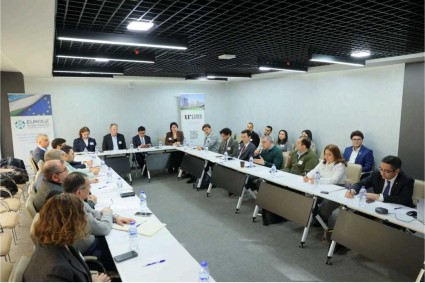On February 1, the president Shavkat Mirziyoyev signed the Status of Teacher Bill into Law, with the immediate effect.
The Law ensures and guarantees the status of a teacher to carry out professional activities, provides social protection, creates organizational and legal conditions for exercising their rights.
“The rights, honor, dignity and business reputation of a teacher shall be protected by the state,” the document emphasized.
The Law prohibits:
- interference in the professional activities of a teacher, unreasonable checking up of their activities, influence on the teacher’s correct and objective assessment of students’ knowledge, as well as preventing them from fulfilling their official duties;
- engaging a teacher in work not related to their professional activities, including landscaping and agricultural work;
- the requirement from the teacher to generate and provide reports and other information not related to their professional duties, including information on taxes, utility bills, loans and other debts of the population, reports on the employment of graduates;
- engagement of a teacher in the work of registering unemployed, uneducated and under preventive registration of minors, and providing assistance in their social adaptation;
- forcing a teacher to purchase goods and services, including withholding funds for goods and services from the teacher’s salary without their written consent.
Teachers of state educational organizations are provided with teaching aids, primary teaching materials and student supplies free of charge at the expense of the state.
Engaging teachers in events not related to their professional activities, but having political and social significance (participation in the processes of organizing and conducting elections, performing the functions of an audience observer during test tests, assistance in conducting a population census, participation as an expert in verification processes and certification of educational organizations and others), carried out with their consent, on the basis of an agreement concluded with them, for an additional fee, in free time from work or while maintaining the average salary at the place of work.
Forcing a teacher to work in any form, as well as illegal interference in their professional activities or preventing them from performing their official duties, entail administrative and criminal liability. This procedure was introduced back in March 2023.
When carrying out professional activities, a teacher has the right to:
- freedom of choice and use of modern pedagogical technologies, means and methods of teaching and education;
- development and implementation of programs and teaching methods, manifestation of creative activity;
- the requirement to create the necessary conditions for professional activity;
- free use of the services of state information resource and information library centers for educational, scientific and methodological areas;
- taking part in the process of developing state educational standards, state educational requirements, qualification requirements, curricula and training programs;
- scientific, research and creative activities, participation in experimental testing activities, development and implementation of innovations;
- sabbatical leave in accordance with legislative acts;
- participation in the management of an educational organization, as well as in discussing issues related to the activities of an educational organization;
- association and participation in public associations of teachers to represent and protect their professional rights and interests;
- protection from unlawful interference in one’s professional activities;
- independent assessment of the knowledge of students in the assigned class (group, course) during the period of teaching activity;
- the requirement of respect for the teaching profession on the part of students and their parents;
- free compulsory medical examination in government health care institutions;
- participation in the protection of the rights and legitimate interests of students.
Teachers are also waived from paying state fees in civil courts on claims related to the protection of their honor, dignity and business reputation, as well as from paying state fees when appealing in administrative courts against unlawful decisions of state bodies and actions of their officials that violate the rights of teachers.
When carrying out professional activities, the teacher is obliged to:
- respect the honor, dignity and business reputation of participants in the educational process;
- conduct training sessions in a high-quality manner in accordance with curricula and state educational standards;
- take the necessary measures to improve the level of knowledge of students during training sessions;
- use information and communication technologies, advanced and innovative forms and methods of training and education;
- take into account the psychological and individual features, physical and mental health, physiological development of students, pay attention to creating conditions for the education of persons with special educational needs and not discriminate against them;
- carry out educational work with minor students in collaboration with their parents;
- systematically improve qualifications, undergo periodic certification for suitability for the position held;
- comply with the charter, constituent documents, internal labor regulations of the educational organization and the rules of pedagogical ethics;
- undergo mandatory medical examination in a timely manner.
The Law lists those who are not allowed to engage in teaching activities:
- deprived of the right to engage in teaching activities by court verdict;
- recognized by the court as incompetent or partially capable;
- having diseases that prevent them from working as teachers;
- registered in psychiatric or drug treatment institutions.
In addition, it is prohibited to employ persons previously convicted of committing an intentional crime for positions related to teaching activities.













